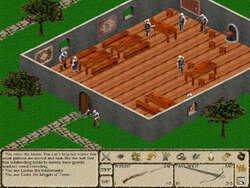This lack of direction is a problem throughout almost the entire game. There are many, many cases in Inquisitor where it is unclear where to go, what to do or who to talk to, not because I'm an especially thick-headed person who can't get obvious hints, but rather because oftentimes the sequence of events to complete a relatively simple task is very, very specific, but the player could easily and logically skip one of those steps. Often it's as simple as needing to talk to a given NPC before getting a dialogue option to open up, even though there's no indication that the player needs to talk with that NPC at all. Much of my time in Inquisitor was spent wandering from X to Y, checking and re-checking conversations to make sure that I hadn't missed anything... not out of compulsion to complete every single piece of content, but because it's usually the only way to proceed.
Additionally, due to the game's focus on drilling every NPC for as much information as possible in order to advance its plot threads, eventually it's possible to just run out of things to do. Once you've spoken to all the NPCs in a town, explored all the areas of the game world, and so on, where else do you go? Sometimes the game expects a very specific and sometimes non-ideal sequence of events to play out, which are portrayed as optional but are in fact mandatory (such as accusing someone of hersey - even if you aren't sure of their guilt, you'll have to interrogate them to get the evidence you need to continue the game). Other times, the solution to advancing the plot will be difficult to find - such as a broken bridge in the Iron Mine dungeon at the end of act 1 requiring either the Levitate spell or finding a very well-hidden secret door - and suddenly the game grinds to a halt until you've completed that requirement, even if that means you are stuck with grinding respawning enemies for five hours to level up enough to get a spell you need.
It's a common complaint about modern games that they don't trust players to figure out how to proceed properly - that the quest compass or objective marker is the lazy developer's way of telling the player how to proceed in the game. But it's also worth remembering that sometimes not including hints on where to go and what to do can lead to a needlessly frustrating play experience. Guiding players is an art - a quest compass might be a brute-force, lowest common denominator method, but at least it works. Without such aids, if the rest of the game's design can't direct the player properly, then that's a failure, old-school or not.














